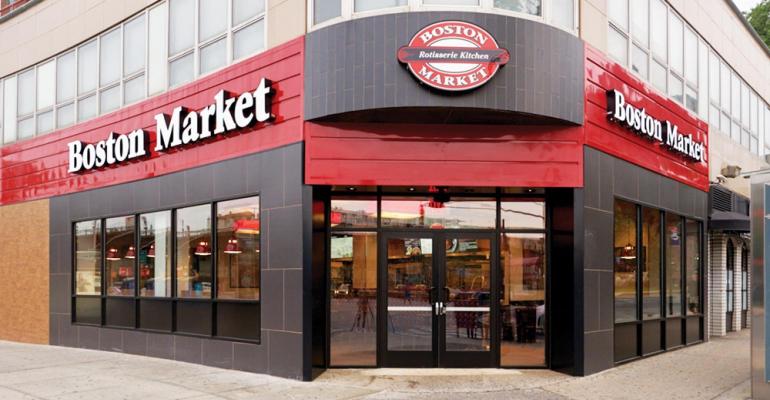On Thanksgiving, customers showed up to a Boston Market in Rancho Cucamonga, Calif. to pick up their pre-ordered Thanksgiving meals and were disappointed to find that the store had unexpectedly closed due to staffing shortages.
The sign out front read, “No employees showing up today… we are unable to fulfill the orders! We are sorry!”
According to Boston Market, the corporate-owned location closed unexpectedly on one of the busiest days of the year for the rotisserie chicken brand due to “staffing issues and equipment shortages.” As of Tuesday, the store was still closed and corporate was working on issuing refunds to those who did not receive their catering orders.
“We attempted and were successful in contacting many of our guests to explain the situation and left messages for those we could not reach,” Slaton Smith, chief marketing officer for Boston Market, told Nation’s Restaurant News. “We will refund every one’s order that was impacted by the location. In the coming days, we will reach out to every one of the Rancho Cucamonga’s customers and offer them voucher for a free meal along with our sincere apologies. […] While our restaurant is still not open due to staffing issues, it’s worth noting that our leadership team went into the location and fulfilled last Friday’s pre-orders and even hand delivered some to guests’ homes.”
Although Smith said that no other locations had been affected, one unhappy Boston Market customer said that he experienced a similar situation when trying to pick up his online order from the Huntington Beach, Calif. location about an hour away from the Rancho Cucamonga store.
“Upon arrival at the Huntington Beach franchise, we were met at the door by one of the employees saying, ‘we are closed,’” customer Erich Moreno said. “We stated that that we online ordered and if our order cannot be fulfilled, can we get a refund? ‘We can't do that,’ was the response.”
Moreno said that he never actually received a call nor a refund from Boston Market, and he knows he is not the only disgruntled customer.
So how could Boston Market — or any operator struggling with employee morale — have avoided this worker walkout that resulted in frustrating customer service problems?
“Boston Market may have had a lot of workers who did not want to come in on Thanksgiving, because it’s a holiday and maybe because that day that is particularly hectic,” said Andrew Duffy, founder and CEO of SparkPlug, an incentive management platform for the retail industry. “If you create a scenario where those employees are getting a portion of the value that is created in that store on that day, either in the form of commissions or for cash rewards for exemplary performance in those environments […] then when people walk into the store, they can upsell and get a piece of the pie.”
Boston Market’s situation is hardly unique. Recently, a Tennessee burrito restaurant shut down its kitchen due to staffing shortages and inflation, Insider reported. NRN has previously written about quick-service and drive-thru restaurants putting up signs claiming that they are closed because “no one wants to work here.” With the labor shortage worsening, operators can’t just put on a Band-Aid to address the holiday rush by bolstering short-term hires. Experts agree that the restaurant industry is in a transitional state and operators will have to fundamentally change how they approach labor investments.
“I think that there's some like fundamental landscape shift that has occurred with COVID,” Vivian Wang, co-founder of recruitment tool, Landed, said. “With the Boston Market closure, they should have known about these issues for weeks or months in advance, because then they would be able to see what the candidate pipeline looks like and what turnover has looked like for that location, so they could have been prepared and not understaffed that day.”
Currently, it’s a buyers’ market for employees and many restaurant staffers are leaving the industry to work in other forms of retail or even to enter the gig economy, which offers more flexibility than standard restaurant industry jobs.
“In order to differentiate as an employer, you have to think holistically about what package you're bringing to the table that competes with an independent contractor job that they might have with DoorDash or Uber,” Wang said.
Flexibility looks like offering adjustable hours and not creating work schedules last-minute. Besides flexibility, Wesley Suitt, head of client success with Americas Group at Harver, a digital volume hiring solutions company, said that communication and making sure you value the employees that are already on staff is key to preventing understaffing and employee walkouts:
“Increase awareness with your current staff of the number of hires needed to execute the volume,” Suitt said. “Offer referral bonuses, sign-on bonuses, stay bonuses and employee meal discounts. Get the entire restaurant/business informed and involved in your staffing needs to ensure a full community effort to get staffed.”
Of course, the biggest incentive restaurants can offer is simply higher wages, which is one of the top reasons workers are leaving the restaurant industry.
“Amazon and Walmart and other big box stores are talking a really big game about the new $15 minimum wage, health benefits, education benefits, etc.,” Duffy said. “Then they're getting offered $8-$10 at the fast-food spot in their hometown and they say, ‘well, that doesn't seem fair to me.’ […] Employers have to meet employees where they are.”
Contact Joanna at [email protected]
Find her on Twitter: @JoannaFantozzi





